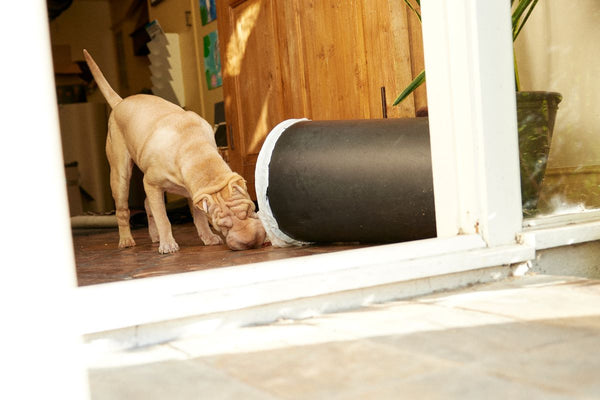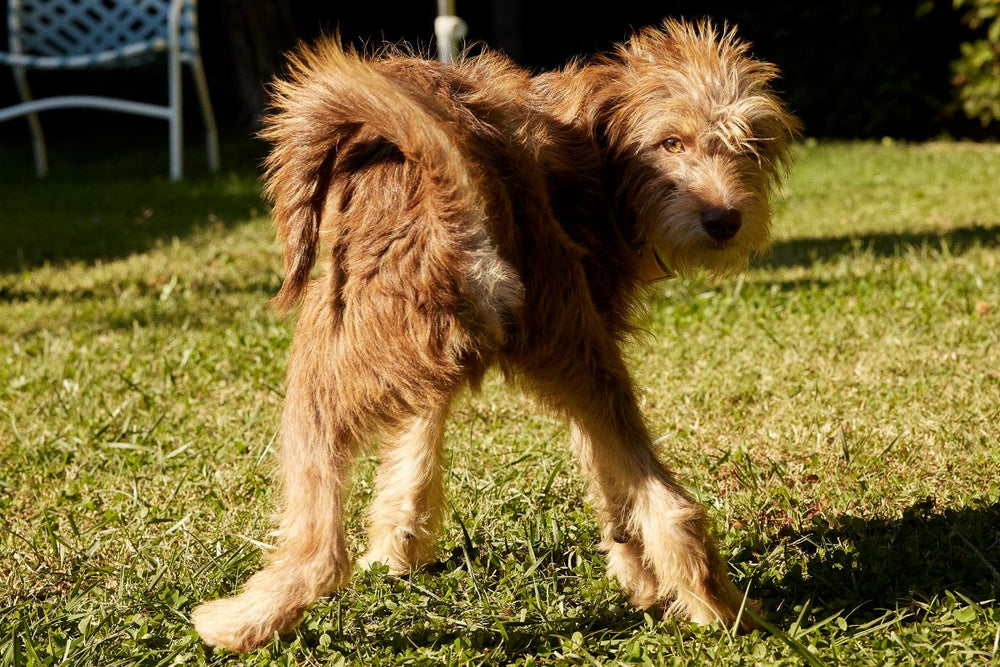By: Dr. Juli, DVM @itsDrJuli
Bringing home a new bundle of fur is an exciting time for pet owners. There is a lot to remember and keep track of when caring for a new puppy, including puppy-proofing your home, numerous veterinary visits, potty training, and socializing, to name a few. It doesn’t take long for a special bond to form with your new puppy, so it can be stressful when your four-legged family member becomes sick. Diarrhea and upset stomachs are not uncommon health issues in puppies; in some cases, loose stool or diarrhea may be the only sign of a problem in a playful puppy. Understanding the possible causes and when to rush or not rush to the veterinarian can help decrease your stress when your puppy is experiencing a health issue.

Common Causes of Puppy Diarrhea
Pet parents can understandably become worried when a puppy shows signs of gastrointestinal (GI) distress. The underlying problem could range from a mild upset stomach to side effects of puppy medication to a fatal disease. Young puppies are prone to numerous diarrhea-causing illnesses because their immune systems are still developing. Common causes of diarrhea in puppies include:
- Dietary changes. Navigating puppyhood involves, among other things, finding the right food for your pup’s health. Many pet owners will experiment with new treats or diets during the first few months. Your puppy’s diarrhea may simply be a sign of food allergies. However, sudden diet changes can cause diarrhea or loose stools, especially in a puppy’s developing GI tract. Always ensure a slow transition over a few weeks when switching your dog’s diet, and consult your vet on the best options for your pup.
- Stress. Like humans, anxiety, stress, and fear can lead to GI inflammation, resulting in colitis and diarrhea. Traveling, vet visits, or leaving your pup while you are at work can cause anxiety in some dogs, leading to stress-induced diarrhea.
- Garbage, toxic foods, and foreign objects. Puppies explore new environments with their nose, mouth, and paws. Counter surfing and diving for table scraps may be a hobby for your pup, but this can lead to ingesting toxic foods or dangerous objects. Diarrhea is a common sign of pets who have ingested garbage or human food that might be too rich or fatty for their GI system.
- Intestinal parasites. Puppies are prone to intestinal parasites, likely contracted from their previous environment. Common GI parasites affecting puppies include roundworms, hookworms, whipworms, tapeworms, giardia, and coccidia. Parasites are not always visible in the stool. Signs of an infection may consist of a rounded belly, dull fur coat, weight loss, lethargy, and vomiting.
- Viruses. Unvaccinated or partially-vaccinated puppies are at risk for contracting contagious viral infections, which can be fatal in some cases. Diarrhea or bloody stool is the most common sign of parvovirus. Other diarrhea-causing viruses include distemper, coronavirus, and adenovirus (infectious hepatitis).
- Bacterial infections. A puppy’s developing immune system makes them more prone to bacterial infections, like clostridium, E.coli, and salmonella. Other signs, including bloody stool, fever, vomiting, and lethargy, often accompany these infections.

When to Go to the Veterinarian for Your Puppy’s Diarrhea
Always consult your veterinarian if you are worried about your pup’s health. Diarrhea or changes in your puppy’s poop are common symptoms of numerous diseases. Additionally, diarrhea may be the only sign of a serious problem during the early stages of potentially fatal diseases like parvovirus. Determining the severity of your puppy’s diarrhea depends on their vaccination status and the presence of other clinical signs.
Bring your puppy for a veterinary examination if they are unvaccinated or showing any of the following symptoms:
- Diarrhea that lasts more than 24 hours
- Bloody diarrhea or dark, tarry stool
- Changes in stool color
- Liquid diarrhea
- Vomiting
- Straining to defecate
- Distended or bloated abdomen
- Increased mucous on the feces
- Changes in stool color
- Fever
- Decreased appetite
- Abdominal pain
- Lethargy
Monitoring your vaccinated puppy with diarrhea for 24 hours may be sufficient if their mood is unchanged and they appear to be acting normal. However, keep your puppy away from other dogs, as they could be carrying an infectious disease or shedding intestinal parasites. If your puppy is still experiencing diarrhea signs after 24 hours, bring them for a veterinary examination to determine the underlying cause. Your veterinarian may recommend several diagnostic tests, including a fecal test for intestinal parasites, blood work, and imaging, like an X-ray, to rule out possible blockages or obstructions in the gastrointestinal tract. Ensure to inform your veterinarian of any new diet changes, new treats, medications, or potential toxins that your puppy could have ingested.
How to Support Your Puppy with Diarrhea: Common Treatments
Treatment for your puppy’s diarrhea will depend on the underlying cause and a plan from your DVM. In many cases, dog diarrhea can be addressed with home treatment, but puppies with severe diarrhea are at risk for dehydration and may require hospitalization to receive intravenous (IV) fluid therapy. Other treatments may include:
- Antibiotics to treat a primary GI infection or prevent secondary infections.
- Deworming medication.
- Anti-nausea medication.
- Feeding a bland diet or prescription diet for a short period to calm the digestive tract.
- Giving your dog a probiotic supplement to rebalance their gut flora.
- Adding a fiber supplement to your puppy’s food to help firm up their stool.
How to Prevent Puppy Diarrhea
Regular veterinary care is your best insurance against puppy diarrhea. Your veterinarian will recommend a vaccination schedule and preventive care medication based on your puppy’s lifestyle, breed, and overall health. Do not skip vaccination appointments. Partially-vaccinated puppies are still at risk for potentially fatal diseases, like parvovirus or distemper virus. Other ways to prevent puppy diarrhea include:
- Puppy-proof your home to avoid accidental toxin ingestion.
- Slowly introduce new food or treats to gauge your puppy’s tolerance to the ingredients.
- Never leave your new puppy unsupervised.
- Immediately remove and properly dispose of stool from the environment.
- Avoid dog parks, public places, or socializing with other puppies until your puppy is fully vaccinated.
- Ease into new routines to prevent stress or anxiety from sudden changes.
- Feed your puppy an AAFCO-approved dog food as part of a complete and balanced puppy diet.

For more information and tips on your dog’s health, check out the Native Pet blog.


